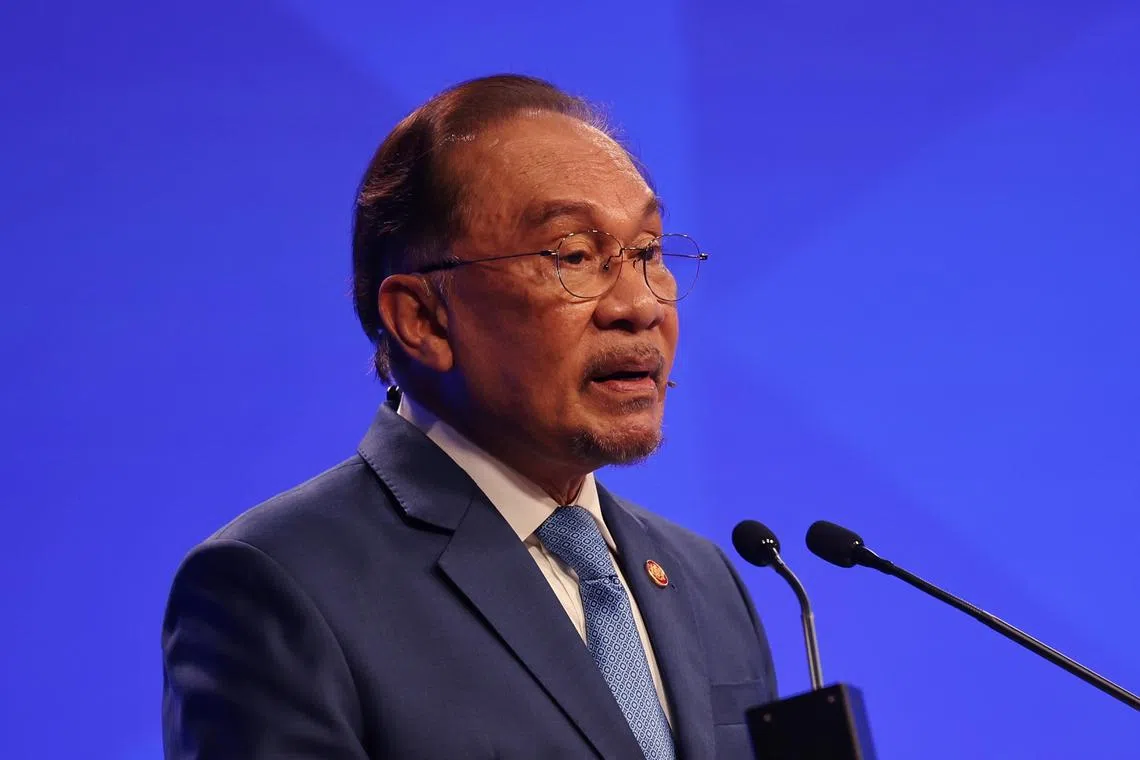Malaysian court rejects PM Anwar’s immunity bid, paving way for civil trial on alleged sex assault
Sign up now: Get insights on the biggest stories in Malaysia

Prime Minister Anwar Ibrahim says the lawsuit may be "politically motivated, or institutionally disruptive”.
ST PHOTO: JASON QUAH
KUALA LUMPUR - Malaysian Prime Minister Anwar Ibrahim on June 4 failed in his bid for immunity from liability while in office, paving the way for a civil lawsuit involving allegations of sexual assault against him to proceed on June 16.
The High Court rejected Datuk Seri Anwar’s application to refer eight constitutional questions to the Federal Court.
High Court judge Roz Mawar Rozain ruled that the questions did not warrant immediate constitutional referral and that the lawsuit could proceed through the regular civil process.
“From a judicial perspective, the proposed questions do not appear to meet the threshold of genuine constitutional controversy,” she said. There is “no express constitutional or statutory immunity accorded to a sitting prime minister for private acts pre-office”, she added.
In response to the decision, Mr Anwar said in a statement: “This matter has never been about seeking personal immunity or escaping legal scrutiny. It concerns the integrity of our constitutional system and the need to ensure that high public office is protected from litigation that may be strategically timed, politically motivated, or institutionally disruptive.”
The lawsuit, brought by Mr Anwar’s former research assistant Muhammed Yusoff Rawther, concerns an alleged incident that took place in 2018,
Mr Yusoff, now 31, claimed to have suffered serious physical, psychological and social trauma as a result of the incident.
Mr Anwar, 77, has denied the claims, saying the charges had been fabricated to smear his political image.
His lawyers argue that such civil suits against a sitting prime minister risk interfering with his constitutional duties and could undermine the executive’s ability to function. They cite Articles 5, 8, 39, 40 and 43 of the Federal Constitution, which outline executive powers, to support the need for immunity.
They say that the matter should be tested before the Federal Court before any trial proceeds.
The Prime Minister had filed the application on May 23, seeking for the High Court, which is hearing the suit, to refer the eight legal questions to the Federal Court.
The court’s ruling means the civil case is now back on track for a full hearing from June 16, putting renewed scrutiny on Mr Anwar’s administration. Mr Anwar’s legal team can still appeal against the decision with the Court of Appeal within 30 days.
Mr Yusoff’s lawyer, Mr Muhammad Rafique Rashid Ali, welcomed the June 4 ruling.
“The importance of today’s decision (is that it) ensures that in Malaysia right now, we have a judiciary that has stamped very clearly that there is equality for everyone under the Constitution,” he told The Straits Times.
“When an executive or a person in power wants to shield himself with immunity as proposed by Anwar Ibrahim or anyone in power later on, the normal people are being shielded against that executive use of power by the courts.”
The Premier has had his own past battles with the legal system, having been convicted of committing sodomy and abuse of power, charges which he had always maintained were politically motivated.
Mr Yusoff has been detained by the police since September 2024. He is currently on trial on charges of drug trafficking and possessing imitation firearms, and faces life imprisonment and caning if convicted. He has denied the allegations and claimed he was framed by people in power.
Hazlin Hassan is Malaysia correspondent at The Straits Times.



